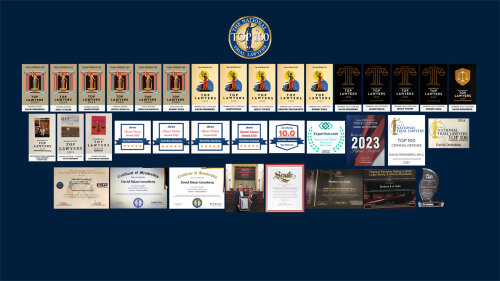Best Foreclosure Lawyers in California
Share your needs with us, get contacted by law firms.
Free. Takes 2 min.
Free Guide to Hiring a Real Estate Lawyer
Or refine your search by selecting a city:
List of the best lawyers in California, United States
About Foreclosure Law in California, United States
Foreclosure law in California governs the process by which lenders can reclaim property when a homeowner defaults on their mortgage. Foreclosure is a legal action that allows a lender to sell the property secured by the loan to recover the unpaid balance. In California, foreclosure can be either judicial (handled through the courts) or nonjudicial (processed outside of court, typically through a trustee sale). Nonjudicial foreclosures are far more common. Due to California's unique procedures and homeowner protections, understanding local foreclosure laws is critical for anyone facing this situation.
Why You May Need a Lawyer
People often need a lawyer for foreclosure matters because the process can be complex, stressful, and fast-paced. Common scenarios where legal help is invaluable include:
- Receiving a Notice of Default or Notice of Trustee’s Sale
- Needing help to negotiate a loan modification or forbearance agreement
- Challenging wrongful foreclosure or errors in the foreclosure process
- Dealing with complex financial and legal paperwork
- Seeking alternatives to foreclosure, such as short sales or deeds in lieu
- Facing allegations of mortgage fraud or predatory lending
- Wanting to understand rights and options as a homeowner
- Desiring to protect credit, obtain time to move, or negotiate cash for keys
A qualified attorney can explain your rights, assess your specific case, and represent you in negotiations or court if needed.
Local Laws Overview
California foreclosure law is governed by both state statutes and federal protections. Some notable aspects include:
- Most foreclosures in California are nonjudicial, meaning lenders can foreclose without going to court, provided they follow the required process.
- Lenders must send a Notice of Default at least thirty days after the loan has become delinquent and attempt to contact the borrower to discuss options before starting foreclosure.
- After the Notice of Default, a minimum three-month waiting period applies before a Notice of Trustee’s Sale can be issued.
- Homeowners can stop the sale by paying the default amount at any time before the sale occurs.
- California law provides certain protections, including notice requirements, restrictions on dual tracking (pursuing foreclosure while negotiating a loan modification), and limits on deficiency judgments for most residential foreclosures.
- Tenants in foreclosed properties have rights and protections under both California law and federal law.
Frequently Asked Questions
What is the difference between judicial and nonjudicial foreclosure?
Judicial foreclosure involves court proceedings, while nonjudicial foreclosure is completed outside of court through a trustee. Most California foreclosures are nonjudicial, which makes the process quicker and often less expensive for lenders.
How long does the foreclosure process take in California?
The nonjudicial foreclosure process typically takes four to six months from the first missed payment, but timelines can vary based on lender actions and borrower responses.
Can I stop a foreclosure once it has started?
Yes, you can stop the process by catching up on missed payments and costs, negotiating a loan modification with your lender, or filing for bankruptcy, which triggers an automatic stay. Consulting a lawyer early increases your options.
What notices should I expect during foreclosure?
Key notices include a Notice of Default (the formal start of foreclosure), and later, a Notice of Trustee’s Sale (listing the date and location of the auction).
Is there any way to save my home after receiving a Notice of Default?
You may have options including repayment plans, loan modification, forbearance, short sale, or deed in lieu of foreclosure. Contacting a lawyer or HUD-certified housing counselor can help you understand and pursue these options.
Does nonjudicial foreclosure affect my credit?
Yes, a foreclosure will negatively impact your credit score, making it more difficult to obtain future loans or credit. Alternatives like loan modifications or short sales may have less impact.
Will I owe money after foreclosure?
For most residential nonjudicial foreclosures in California, the lender cannot pursue you for a deficiency if the property sold for less than the loan amount, but exceptions apply. Judicial foreclosures and certain loan types may be treated differently.
Can tenants remain in a foreclosed property?
Tenants have rights under state and federal law, including at least ninety days’ notice before eviction, and sometimes the right to stay until the end of their lease unless the new owner will occupy the home as a primary residence.
What is dual tracking and why is it prohibited?
Dual tracking occurs when a lender pursues foreclosure while simultaneously processing a loan modification. California law restricts this practice to protect homeowners and ensure fair consideration of alternatives to foreclosure.
When should I consult an attorney about foreclosure?
It is wise to seek legal advice as soon as you fall behind on payments or receive any foreclosure notices. An attorney can explain your rights, review your case, and help you navigate the process effectively.
Additional Resources
If you need further assistance or information about foreclosure in California, consider these resources:
- California Department of Consumer Affairs - Offers consumer guides and resources for homeowners
- California Courts Self-Help Center - Provides information on foreclosure and legal procedures
- Department of Housing and Urban Development (HUD) - Offers free counseling to homeowners facing foreclosure
- California State Bar - Find a lawyer referral service or learn about foreclosure law
- Local legal aid organizations - Some provide free or low-cost help for eligible homeowners
Next Steps
If you are facing foreclosure or fear you might in the near future, consider the following steps:
- Read all notices and letters from your lender as soon as they arrive
- Gather your loan documents, payment records, and correspondence
- Contact your lender to explore options such as forbearance or modification
- Consult with a qualified foreclosure attorney to review your rights and options
- Consider reaching out to a HUD-approved housing counselor for free advice
- Act quickly - the earlier you seek help, the more options you may have
Remember, foreclosure is a legal process with significant consequences. Consulting with a legal professional who understands California foreclosure law can help you make informed decisions, protect your interests, and potentially save your home.
Lawzana helps you find the best lawyers and law firms in California through a curated and pre-screened list of qualified legal professionals. Our platform offers rankings and detailed profiles of attorneys and law firms, allowing you to compare based on practice areas, including Foreclosure, experience, and client feedback.
Each profile includes a description of the firm's areas of practice, client reviews, team members and partners, year of establishment, spoken languages, office locations, contact information, social media presence, and any published articles or resources. Most firms on our platform speak English and are experienced in both local and international legal matters.
Get a quote from top-rated law firms in California, United States — quickly, securely, and without unnecessary hassle.
Disclaimer:
The information provided on this page is for general informational purposes only and does not constitute legal advice. While we strive to ensure the accuracy and relevance of the content, legal information may change over time, and interpretations of the law can vary. You should always consult with a qualified legal professional for advice specific to your situation.
We disclaim all liability for actions taken or not taken based on the content of this page. If you believe any information is incorrect or outdated, please contact us, and we will review and update it where appropriate.
Browse foreclosure law firms by city in California
Refine your search by selecting a city.














